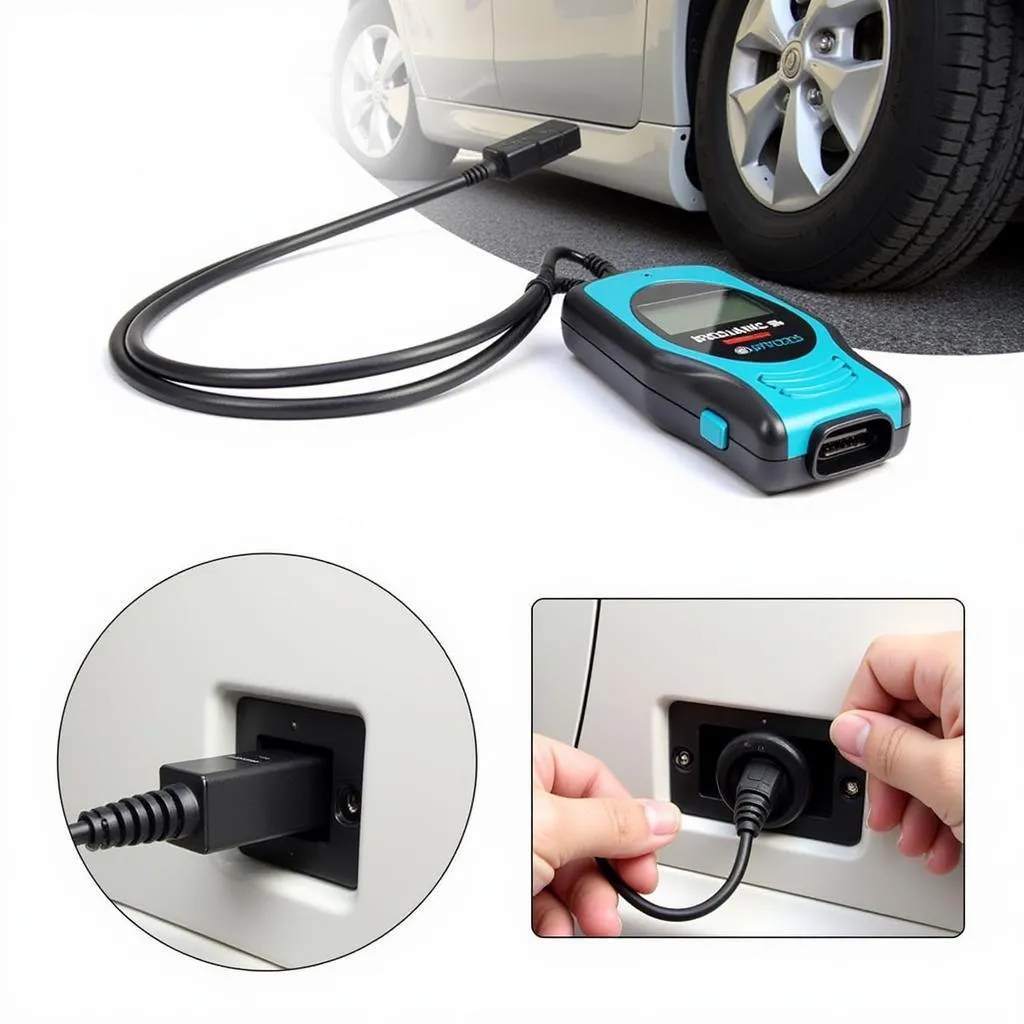Choosing the right car diagnostic tool can feel like a daunting task, especially for those new to the automotive world. With an array of options available, knowing where to start can be confusing. This comprehensive guide will equip you with the knowledge and understanding needed to navigate the vast landscape of car diagnostic tools.
What are Car Diagnostic Tools?
Car diagnostic tools, also known as scan tools, are essential devices that allow technicians and car enthusiasts to communicate with a vehicle’s onboard computer system, known as the Electronic Control Unit (ECU). These tools can read and analyze diagnostic trouble codes (DTCs) that are stored in the ECU, helping to identify and troubleshoot a wide range of vehicle problems.
Why Use a Car Diagnostic Tool?
Utilizing a car diagnostic tool offers numerous advantages for both professionals and individuals:
- Quick and Accurate Diagnosis: Identify the root cause of vehicle issues rapidly, saving time and money.
- Reduce Repair Costs: Prevent unnecessary repairs by pinpointing the exact problem, eliminating guesswork.
- Access Live Data: Monitor real-time sensor readings and system performance, providing insights into potential problems.
- Clear Check Engine Lights: Quickly reset check engine lights once issues are resolved, restoring proper vehicle function.
- Boost DIY Skills: Empower car enthusiasts to diagnose and repair their vehicles themselves, fostering a deeper understanding of their car.
Types of Car Diagnostic Tools
Car diagnostic tools come in various forms, each with specific capabilities:
1. OBDII Scanners:
- Basic OBDII Scanners: Read and clear generic DTCs, retrieve vehicle information, and provide basic data readings. These are budget-friendly and perfect for simple troubleshooting.
- Advanced OBDII Scanners: Offer extended functionality, including reading manufacturer-specific DTCs, viewing live data streams, and performing bi-directional controls.
2. Specialty Scan Tools:
- Manufacturer-Specific Scan Tools: Designed for specific vehicle makes and models, offering in-depth diagnostics and programming capabilities. These are essential for professional mechanics.
- Multi-Brand Scan Tools: Support a wide range of car brands and models, providing versatility and convenience.
3. Software-Based Scan Tools:
- Laptop-Based Diagnostic Software: Powerful software solutions that require a laptop for analysis and programming. They offer advanced features and are widely used by professionals.
- Smartphone/Tablet-Based Apps: Convenient and portable options that connect to the vehicle via Bluetooth or Wi-Fi. They often offer basic OBDII functionality and compatibility with various platforms.
Choosing the Right Car Diagnostic Tool
Selecting the appropriate car diagnostic tool depends on your needs and expertise:
- DIY Enthusiasts: A basic OBDII scanner is a great starting point for troubleshooting common issues.
- Professional Mechanics: Advanced OBDII scanners, manufacturer-specific tools, and software-based solutions are essential for comprehensive diagnostics and repairs.
- Specific Needs: For specialized tasks like resetting service lights or programming modules, consider specialized scan tools.
Here’s a helpful tip from our expert, Mark Thompson, a seasoned automotive technician:
“It’s crucial to research and choose a tool compatible with your vehicle’s year, make, and model. Always prioritize compatibility before making a purchase.”
Common Features of Car Diagnostic Tools
Most car diagnostic tools offer these core features:
- DTC Retrieval: Reading and clearing diagnostic trouble codes stored in the ECU.
- Live Data Stream: Viewing real-time sensor readings and system performance data.
- Freeze Frame Data: Accessing the conditions of the vehicle when a fault occurred, aiding in diagnosis.
- Actuator Tests: Testing components and systems like solenoids, sensors, and actuators.
- Vehicle Information: Retrieving VIN (Vehicle Identification Number), calibration information, and other vehicle details.
Frequently Asked Questions
Q: What is the difference between an OBDII scanner and a car diagnostic tool?
A: All OBDII scanners are car diagnostic tools, but not all car diagnostic tools are OBDII scanners. OBDII scanners are specifically designed for vehicles with OBDII ports, while car diagnostic tools encompass a wider range of devices with varying capabilities.
Q: Can I use a car diagnostic tool on any car?
A: Not all tools are compatible with all cars. Some tools are limited to specific makes and models, while others offer broader compatibility. Always check the specifications and ensure compatibility before purchasing.
Q: Are car diagnostic tools difficult to use?
A: Most basic OBDII scanners are user-friendly and come with easy-to-follow instructions. Advanced tools might require more technical knowledge and training.
Q: How often should I use a car diagnostic tool?
A: Regularly scanning your vehicle can help detect potential problems before they become major issues. Consider using a tool every few months or if you notice any changes in your car’s performance.
Q: How much do car diagnostic tools cost?
A: Prices vary widely depending on the type and functionality of the tool. Basic OBDII scanners can be purchased for under $50, while advanced tools and software solutions can cost hundreds or even thousands of dollars.
Conclusion
Investing in a car diagnostic tool is a smart decision for both professionals and DIY enthusiasts. By understanding the different types, features, and compatibility factors, you can choose the right tool to meet your specific needs and gain a deeper understanding of your vehicle. Remember, diagnosing issues early can save you significant time, money, and headaches down the road.
 OBDII Scanner for Car Diagnostics
OBDII Scanner for Car Diagnostics
Need Help?
Don’t hesitate to contact us for any questions or assistance. Our expert team is available 24/7 via WhatsApp: +1(641)206-8880, Email: [email protected] or visit our office at 276 Reock St, City of Orange, NJ 07050, United States.